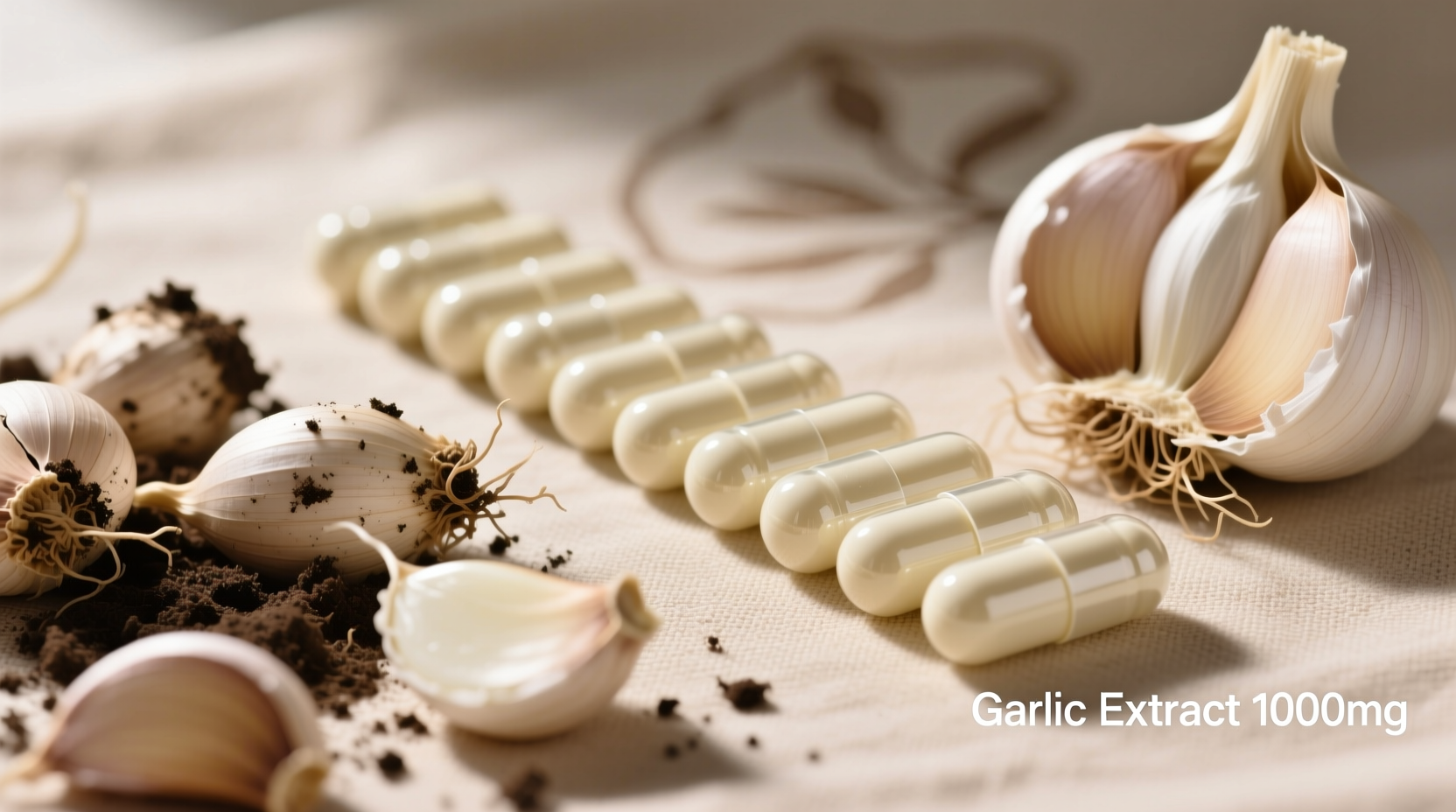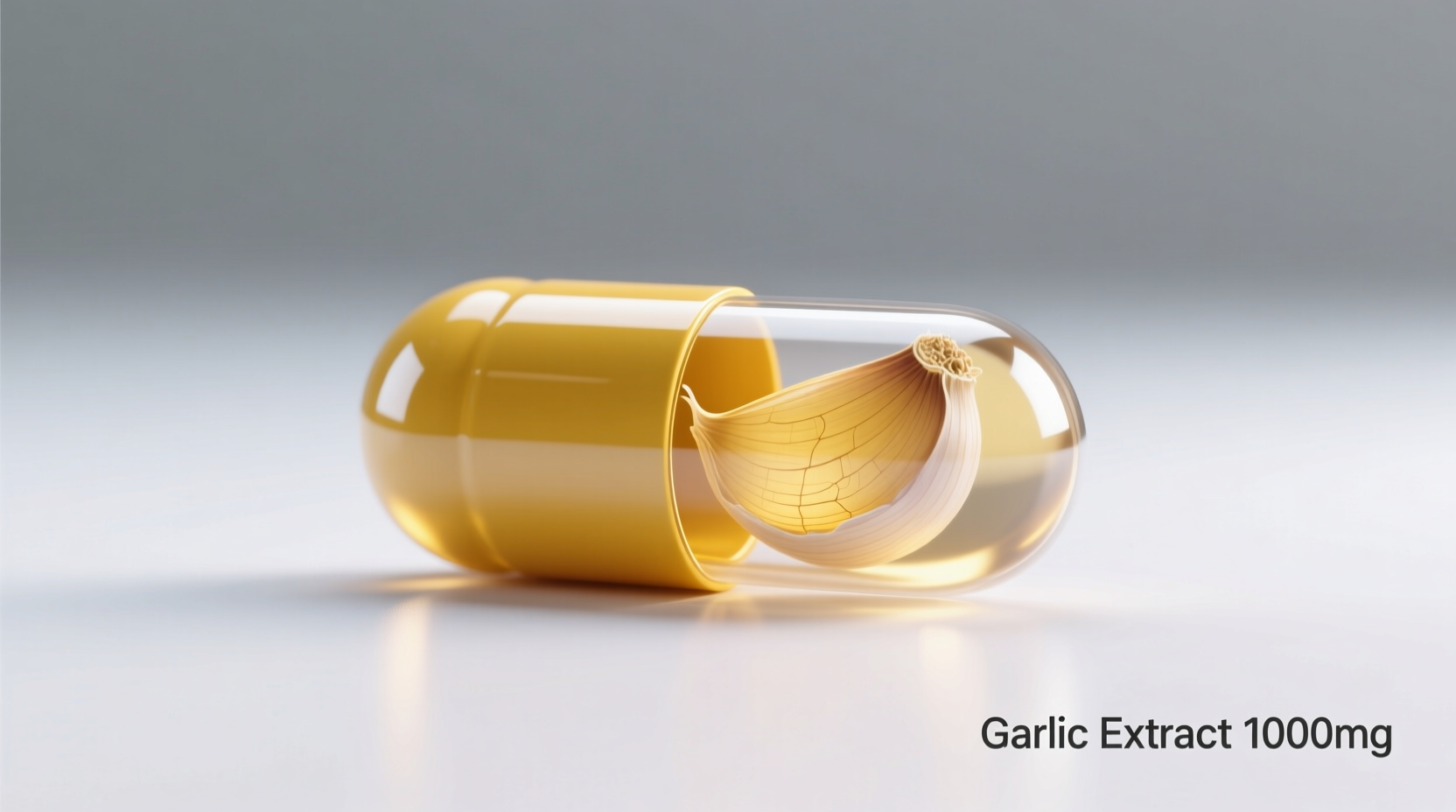When considering garlic supplements, understanding what science actually supports is crucial. Unlike exaggerated marketing claims, evidence shows garlic pills offer specific, measurable benefits primarily for heart health. A comprehensive 2020 meta-analysis in Experimental and Therapeutic Medicine confirmed that aged garlic extract consistently reduces systolic blood pressure by 5-8 mmHg in hypertensive individuals—comparable to lifestyle modifications but less potent than prescription medications.
How Garlic Pills Actually Work: Beyond the Hype
Garlic's therapeutic properties stem from allicin, a compound formed when raw garlic is crushed. However, most commercial supplements use processed garlic to eliminate odor, significantly altering bioavailability. The key difference between products lies in their allicin delivery:
- Enteric-coated tablets survive stomach acid to release allicin in the intestine
- Aged garlic extract contains stable compounds like S-allylcysteine
- Garlic oil delivers different sulfur compounds with distinct metabolic effects
According to the National Center for Complementary and Integrative Health (NCCIH), only standardized products guaranteeing specific allicin potential provide consistent results. Products without standardization may contain negligible active compounds despite bold labeling claims.
| Supplement Type | Allicin Delivery | Research Support | Best For |
|---|---|---|---|
| Enteric-coated | High (1.3-2.4 mg/dose) | Strong for BP reduction | Hypertension management |
| Aged garlic extract | None (stable metabolites) | Strong for arterial health | Long-term cardiovascular support |
| Standard garlic powder | Variable (often low) | Limited/inconsistent | General wellness (minimal evidence) |
Evidence-Based Health Benefits: What Works and What Doesn't
Cardiovascular research represents garlic's strongest evidence base. The American Heart Association acknowledges garlic supplements as complementary—but not replacement—therapy for mild hypertension. A landmark 2016 study in Integrated Blood Pressure Control demonstrated that 240-720 mg daily of aged garlic extract reduced coronary plaque progression by 1.5% over 12 months.
Immune support claims require nuance. While garlic shows antimicrobial properties in laboratory settings, human evidence remains limited. A University of Florida clinical trial found that daily garlic supplementation reduced cold incidence by 21% during winter months, but didn't shorten illness duration. This contrasts sharply with popular claims about garlic 'boosting immunity'—it appears to offer modest preventive effects rather than acute immune enhancement.

Practical Usage Guide: Maximizing Benefits Safely
Dosage matters significantly. Research indicates effective doses range from 600-1,200 mg daily of standardized extract, typically divided into two doses. Timing affects absorption—taking garlic supplements with food reduces gastrointestinal side effects but may slightly decrease bioavailability. For cardiovascular benefits, consistency over 8-12 weeks is necessary before measurable effects appear.
Quality verification is essential in the unregulated supplement industry. Look for:
- Third-party testing seals (USP, NSF, ConsumerLab)
- Specific allicin potential or S-allylcysteine content
- Manufacturing date (garlic compounds degrade over time)
The FDA's warning about inconsistent supplement quality remains relevant—many products contain less than 50% of labeled active ingredients. Testing by independent labs like ConsumerLab.com reveals significant quality variations even among reputable brands.
Safety Considerations and Limitations
Garlic supplements interact with several medications, particularly blood thinners like warfarin. The European Medicines Agency documents cases of increased bleeding risk when high-dose garlic supplements combine with anticoagulants. Other considerations:
- Gastrointestinal discomfort affects 10-15% of users
- Surgery requires discontinuation 7-10 days pre-operation
- Pregnancy safety data remains limited
- Not recommended for children under 12 without medical supervision
Realistic expectations are crucial. Garlic pills won't replace statins for significant cholesterol issues nor cure infections. They function best as part of a heart-healthy lifestyle including balanced diet and regular exercise. The Mayo Clinic emphasizes that supplements provide modest benefits that accumulate over months—not dramatic immediate results.
Frequently Asked Questions
How long does it take for garlic pills to lower blood pressure?
Research shows measurable blood pressure reductions typically appear after 8-12 weeks of consistent daily use at appropriate doses (600-1,200 mg standardized extract). Maximum effects usually occur around 24 weeks, with systolic reductions averaging 5-8 mmHg in hypertensive individuals.
Can I take garlic pills with blood pressure medication?
Yes, but only under medical supervision. Garlic supplements can enhance the effects of blood pressure medications, potentially causing excessively low readings. Consult your physician before combining, as medication adjustments may be necessary. Never discontinue prescribed medications for garlic supplements.
What's the difference between aged garlic extract and regular garlic pills?
Aged garlic extract undergoes a months-long extraction process that converts unstable allicin into stable compounds like S-allylcysteine, which have better bioavailability and no odor. Regular garlic pills typically contain dried garlic powder that must be converted to allicin in the body. Research shows aged extract provides more consistent cardiovascular benefits with fewer gastrointestinal side effects.
Do garlic pills help prevent colds?
Some evidence suggests modest preventive effects. A clinical trial published in Advances in Therapy found daily aged garlic extract reduced cold incidence by 21% during winter months compared to placebo. However, it didn't reduce symptom severity or duration once illness occurred. This contrasts with popular claims about garlic 'boosting immunity'—it appears to offer limited preventive benefits rather than acute immune enhancement.











 浙公网安备
33010002000092号
浙公网安备
33010002000092号 浙B2-20120091-4
浙B2-20120091-4